Navigating the plethora of marketing attribution software options can be overwhelming when you aim to evaluate and determine the most suitable one for your needs. The goal is clear – to analyze and gauge the efficacy of diverse marketing channels and activities in influencing customer actions, be it purchases or leads. But the challenge lies in selecting the tool that aligns perfectly with your requirements. Fret not; I’ve got you covered!
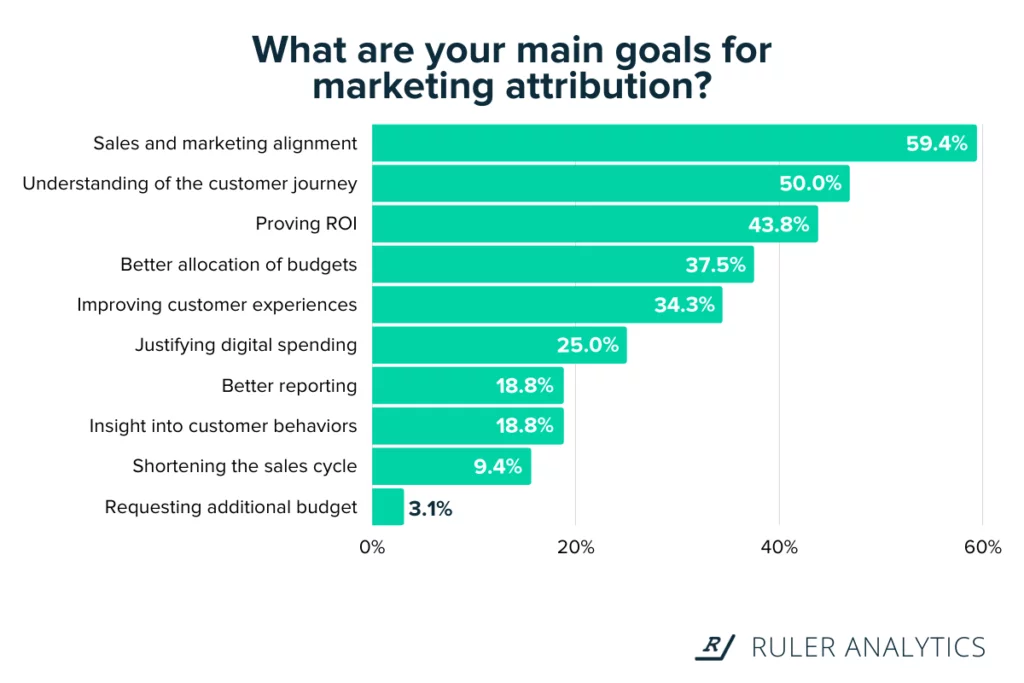
Drawing from my experiences overseeing online stores of various sizes, I’m here to simplify your decision-making process.
Understanding Marketing Attribution Software:
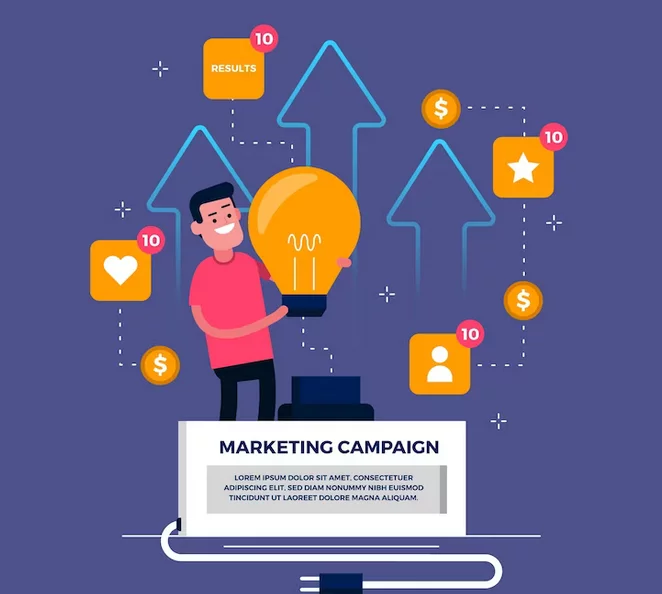
At its core, marketing attribution software serves as a vital instrument for businesses to monitor and dissect the impact of their marketing endeavors across a spectrum of channels. This tool is instrumental in pinpointing the specific marketing strategies and touchpoints that contribute to conversions, whether in sales or leads. By assigning value to each interaction, the software sheds light on the customer journey, revealing the effectiveness of various campaigns or channels.
The primary objective is to furnish businesses with data-driven insights. These insights, derived from the software, empower businesses to allocate their marketing resources more judiciously, thereby enhancing the overall efficiency of their marketing campaigns. So, let’s delve into marketing attribution software and find the one that suits your unique requirements.
Exploring the Variety of Marketing Attribution Software:
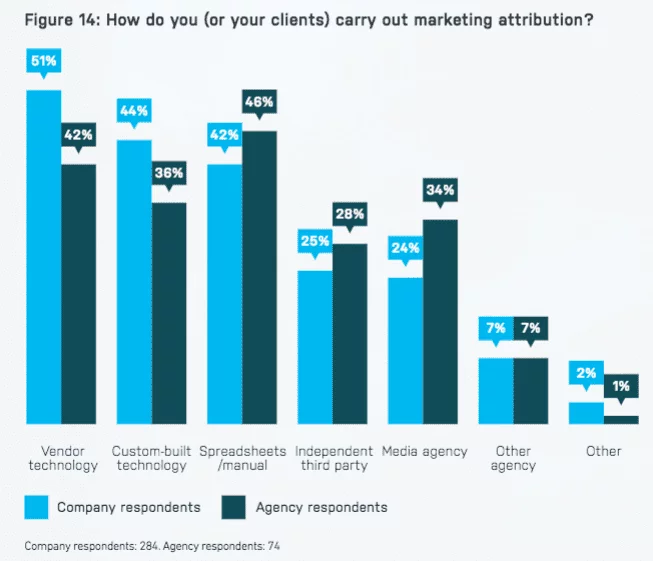
In marketing attribution software, diverse types emerge, each distinguished by the attribution models they employ to credit conversions. This breakdown is essential for businesses seeking a tool that aligns with their specific marketing goals. Let’s delve into the main types:
A. Single-Touch Attribution Software:
Single-touch models allocate the entirety of credit to a single touchpoint, presenting two fundamental variants:
- First-Touch: In this model, if a customer’s initial encounter with a brand is through a social media ad, and they later make a purchase, the social media ad claims full credit.
- Last-Touch: Contrarily, the last touchpoint before a conversion receives all the credit. For instance, if a customer completes a purchase after engaging with a promotional email, the email campaign is attributed full credit.
B. Multi-Touch Attribution Software:
Contrasting with single-touch models, multi-touch attribution software distributes credit across multiple touchpoints along the customer journey. Notable models include:
- Linear Attribution: This model assigns equal credit to all touchpoints. If a customer discovers a brand through a Google ad, engages with a blog post, and finally converts after receiving an email, each touchpoint gets equal credit.
- Algorithmic Attribution Software: Harnessing the power of AI and machine learning, algorithmic attribution software custom allocates credit based on intricate analyses. For instance, if a customer interacts with various touchpoints—a blog post, a webinar, an email campaign, and a social media ad—the software meticulously assesses the impact of each interaction, resulting in a precise and nuanced representation of each touchpoint’s influence.
Top Marketing Attribution Softwares of 2024:
1. Google Analytics: Illuminating Digital Marketing Success
Best Free-to-Use Marketing Software
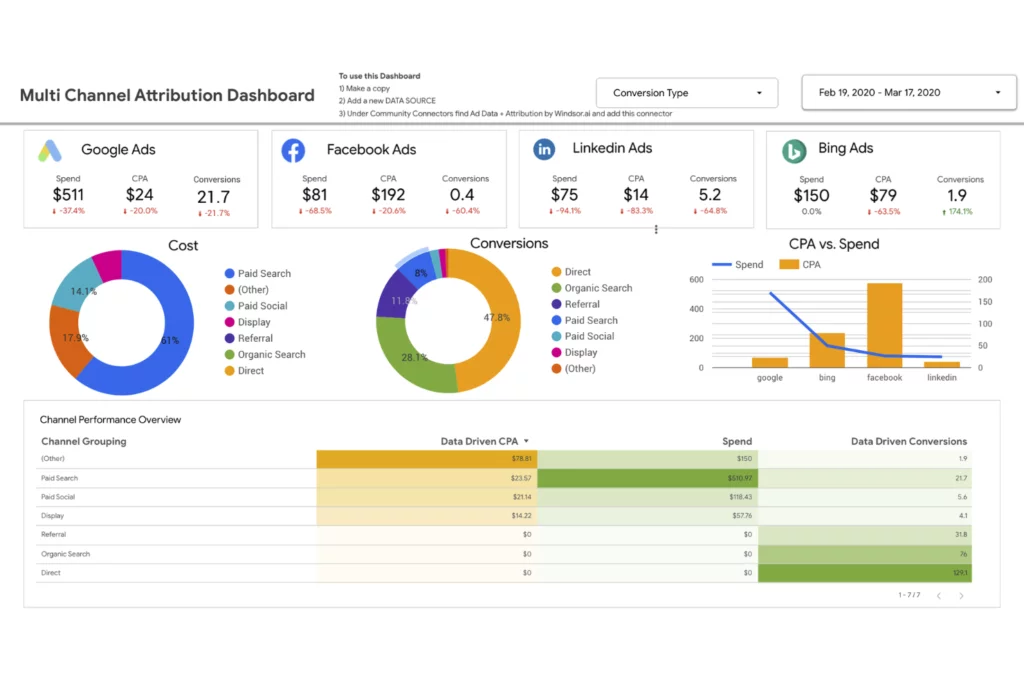
Google Analytics is a powerful and free marketing software, facilitating businesses in attributing conversions to specific marketing channels and campaigns. With 5783 reviews and a user-friendly interface, it empowers organizations to gain valuable insights into the effectiveness of various digital strategies.
Why I Picked Google Analytics: Google Analytics is a versatile tool for marketing attribution insights, allowing businesses to trace and understand the customer journey’s intricacies. Tracking user interactions across various touchpoints and channels enables marketers to attribute conversions to specific marketing campaigns, sources, and content. Google Analytics offers customizable attribution models, such as first-touch, last-touch, and multi-touch, permitting organizations to choose the best-fit model for their unique needs. This empowers marketers to understand how different marketing efforts contribute to conversions, facilitating data-driven decisions about resource allocation, campaign optimization, and audience targeting to maximize ROI.
Standout Features & Integrations:
- Integration with Google Ads and the Google Marketing Platform for precise tracking.
- Integrations with Shopify, WordPress, Facebook, Zendesk, and Marketo offer a comprehensive view of user interactions.
Pros:
- Tons of ways to sort and segment audience data.
- Works in tandem with other vital Google tools.
- Free to use (basic version).
Cons:
- Steep learning curve for new users.
- Frequent updates mean constant re-training.
2. AppsFlyer: Mastering Mobile Attribution
Best for Campaign Fraud Prevention
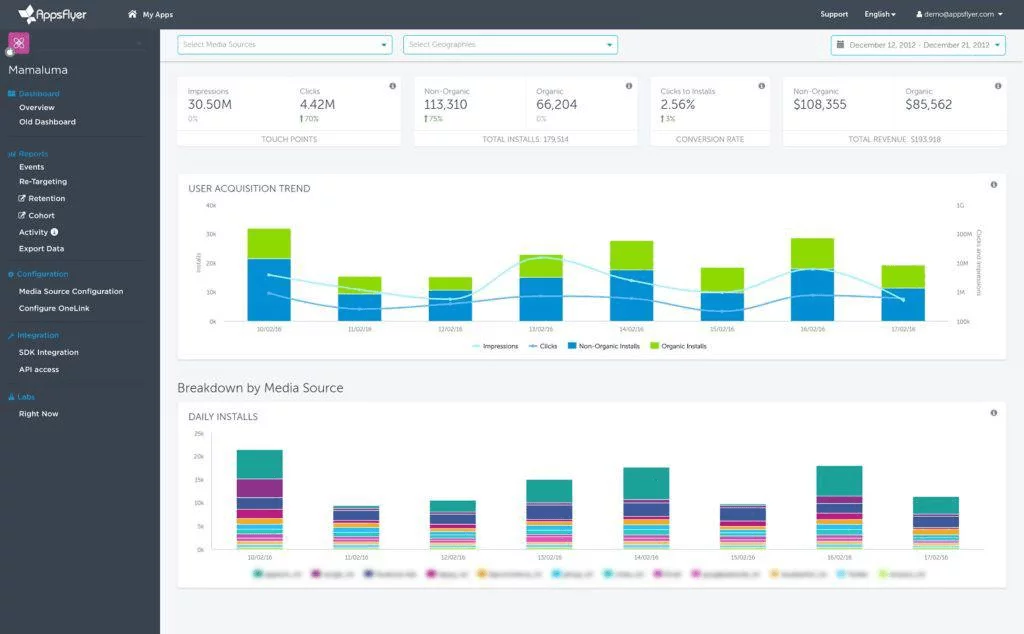
AppsFlyer excels as a marketing attribution software focusing on mobile apps. With 256 reviews and a 30-day free trial, it analyzes post-install behavior, identifies recurring users, and offers real-time insights for optimized performance.
Why I Picked AppsFlyer: AppsFlyer provides comprehensive and real-time insights into the performance of multi-channel campaigns. It seamlessly tracks user interactions across various touchpoints, accurately attributing conversions to their sources. A user-friendly interface and advanced analytics empower marketers to optimize strategies effectively, allocate budgets wisely, and make informed decisions, ultimately maximizing the impact and ROI of their marketing efforts.
Standout Features & Integrations:
- Comprehensive fraud prevention suite, Protect360, employing advanced machine learning algorithms.
- Integrations with Twitter, Facebook, Opera, Adroll, Matomy, and more.
Pros:
- Advanced analytics & customization.
- Global reach & support.
- Aggregated insights & market benchmarks.
Cons:
- Complex pricing structure.
- Learning curve.
3. Ruler Analytics: Bridging Online and Offline Conversions
Best for Offline Conversion Tracking
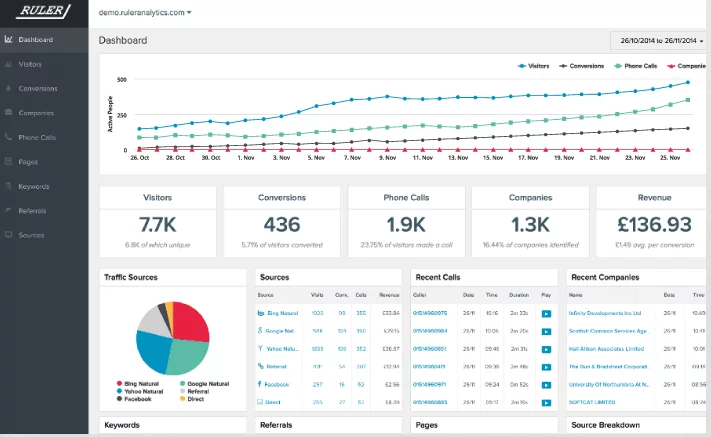
Ruler Analytics bridges the gap between online interactions and offline conversions, providing a comprehensive view of campaign performance. With 11 reviews and a free trial, it accurately tracks each visitor across multiple sessions and attributes conversions.
Why I Picked Ruler: Ruler excels by tracking and attributing digital interactions, phone calls, form submissions, and other offline events to specific marketing touchpoints. This holistic approach enables accurate measurement of the true impact of marketing efforts, optimizing strategies across online and offline channels for informed decision-making and improved ROI.
Standout Features & Integrations:
- Ability to track offline conversions by integrating with CRM systems, call-tracking solutions, and other data sources.
- Integrations with Google Analytics, Google Ads, Salesforce, Microsoft Dynamics, Facebook Conversions, and more.
Pros:
- Online + offline conversion tracking.
- Integration with various data sources.
- Track the entire path a visitor takes before converting.
Cons:
- Installing the code may prove tricky.
- Setup complexity.
4. Oktopost: Elevating B2B Social Media Attribution
Best B2B Software Marketing Attribution
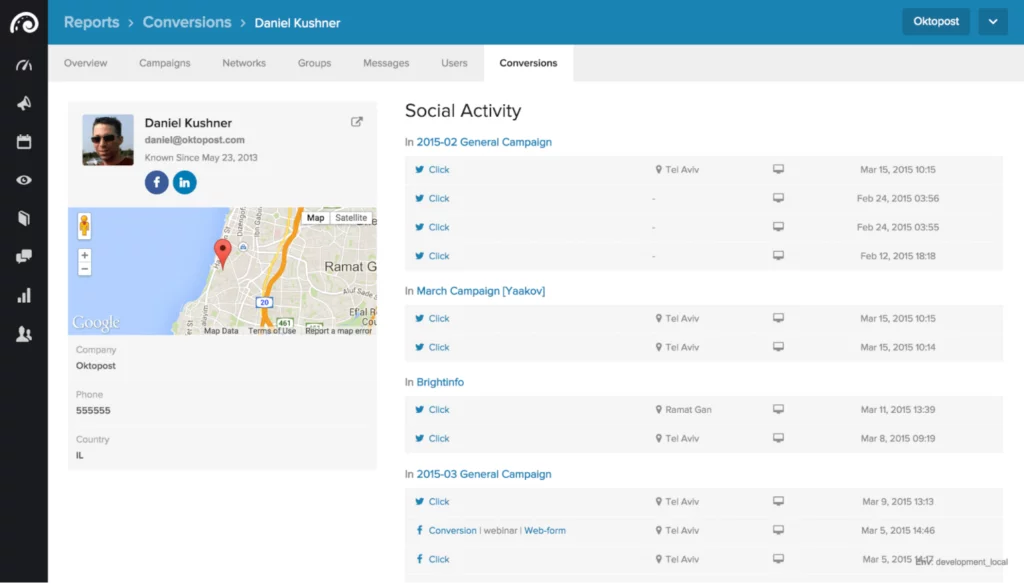
Oktopost is a robust platform designed explicitly for B2B social media attribution, offering sophisticated tools to track and attribute conversions across various social media channels. With 127 reviews and a free demo, it provides rich social media analytics tailored to B2B marketing goals.
Why I Picked Oktopost: Oktopost excels in providing a streamlined platform for B2B social media attribution, offering advanced tracking capabilities to identify the impact of social media efforts on lead generation and sales. Its focus on B2B marketing delivers specialized tracking and attribution features, including lead source tracking, multi-touch attribution models, and integration with popular B2B marketing platforms like Salesforce and Marketo.
Standout Features & Integrations:
- Specialization in B2B social media attribution with tools tailored for longer sales cycles.
- Integration with Marketo, Act-On, Eloqua, HubSpot, and popular social media channels.
Pros & Cons: Pros:
- Advanced tracking & analytics.
- Employee advocacy & amplification.
- B2B social media attribution.
Cons:
- Leaderboard segmentation could be better organized.
- Limited focus on B2C.
Learn about the difference between affiliate marketing and lead generation here.
5. Kochava: Mastering Omni-Channel Attribution
Best Omni-Channel Attribution Software
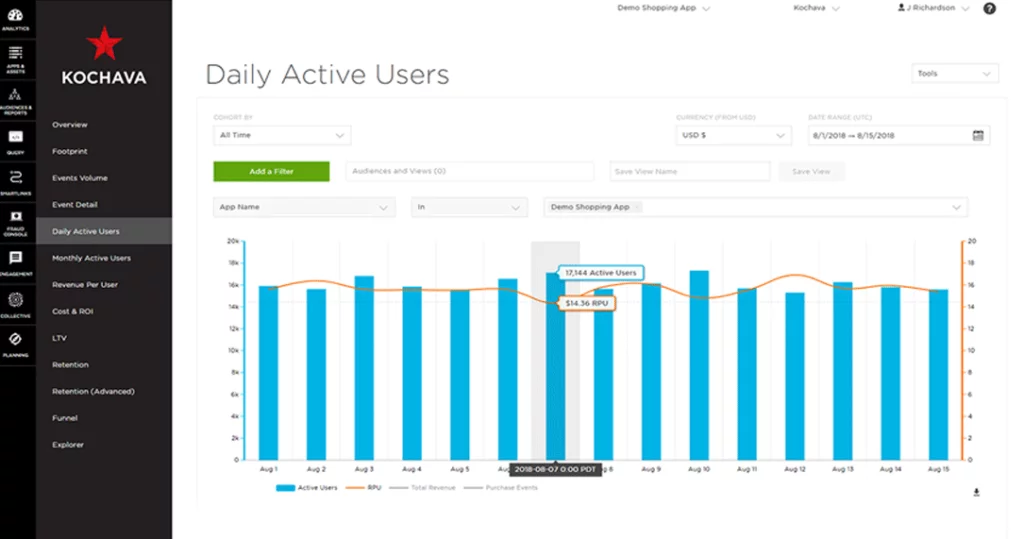
Kochava offers a comprehensive and flexible platform for tracking and analyzing user interactions across various channels and devices. With 78 reviews and a 30-day free trial, it enables people-based marketers to establish, track, and optimize campaigns across all connected devices.
Why I Picked Kochava: Kochava stands out as an omni-channel attribution software, allowing businesses to track and analyze user interactions comprehensively. Its advanced attribution models and real-time analytics provide a deep understanding of campaign performance. With a focus on holistic measurement, Kochava accommodates complex customer journeys, offering customizable attribution settings for accurate resource allocation and data-driven decision-making.
Standout Features & Integrations:
- Unified Audience Platform for integrating identity and engagement data from various sources.
- Web SDK for tracking sites and web apps, plus first-class APIs for custom builds.
Pros:
- Comprehensive omni-channel attribution.
- Fraud prevention with Fraud Console.
- Offers free app analytics.
Cons:
- App errors sometimes delay reports.
- Simple tasks are hidden in menus.
6. Google Attribution 360: Enterprise-Level Attribution Excellence
Best Marketing Attribution Software for Small Businesses
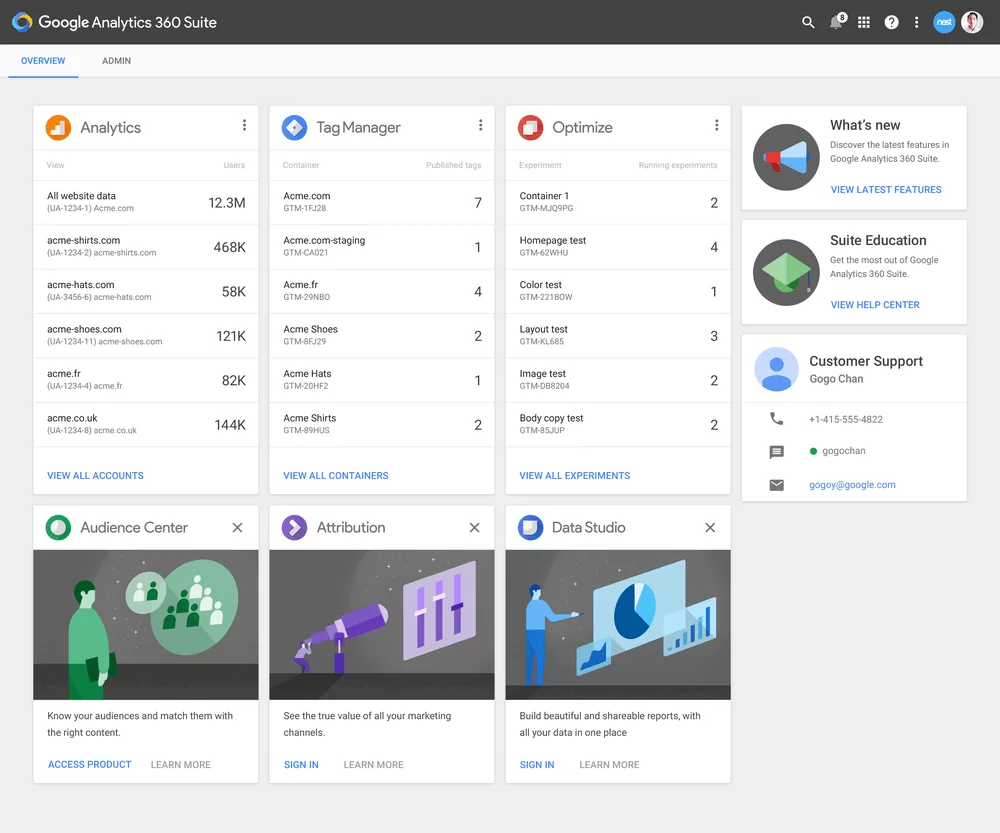
Google Attribution 360 excels as an enterprise-level solution that seamlessly integrates with Google’s advertising ecosystem. With a free version and pricing upon request, it offers robust data collection and analysis capabilities for a comprehensive view of the customer journey.
Why I Picked Google Attribution 360: Google Attribution 360 provides an enterprise-level solution that seamlessly integrates with Google’s extensive data ecosystem. Its ability to handle large-scale data sets, advanced attribution modeling, and consideration of various attribution pathways make it stand out. This platform offers a holistic view of user interactions across various Google platforms, enabling marketers to analyze the entire customer journey and gain insights into user behavior for effective campaign optimization.
Standout Features & Integrations:
- Seamless integration with Google Ads, Google Analytics, and DoubleClick.
- Integration with the Google suite of apps and programs.
Pros:
- Scalability for enterprise.
- Advanced machine learning & attribution modeling.
- Free to use version.
Cons:
- Dashboard could be more customizable.
- Dependency on Google Ecosystem.
7. Statcounter: Real-Time Insights for Website Optimization
Best Free Marketing Attribution Software
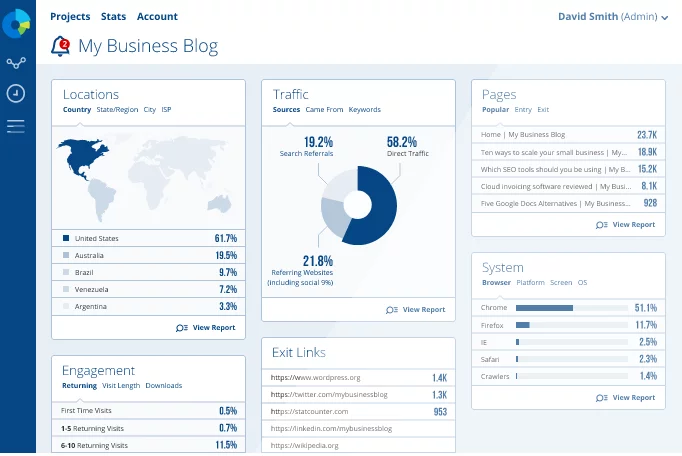
Statcounter is a user-friendly and accessible platform for tracking and analyzing website visitor behavior. With a 30-day free trial and plans starting from $9/month, Statcounter provides detailed insights into visitor interactions, helping marketers optimize web strategies for improved user experience and conversion rates.
Why I Picked Statcounter: Statcounter excels as a marketing attribution software by offering real-time insights into website visitor behavior. Its detailed tracking of user interactions beyond basic pageviews provides a comprehensive view, including clicks, downloads, and scrolling behavior. With an emphasis on accessibility and user-friendly analytics, Statcounter enables marketers to understand the effectiveness of different online touchpoints and make informed decisions for improved engagement and conversion rates.
Standout Features & Integrations:
- Detailed visitor behavior tracking, going beyond basic analytics.
- Integration with popular website platforms like WordPress, Joomla, and various blogging platforms.
Pros:
- Customizable alert system.
- Detailed visitor insights.
- User-friendly interface.
Cons:
- Comparatively feature-lite.
- Limited integrations.
8. Nielsen Visual IQ: Enterprise-Level Data-Driven Attribution
Best Marketing Attribution Software for Enterprises
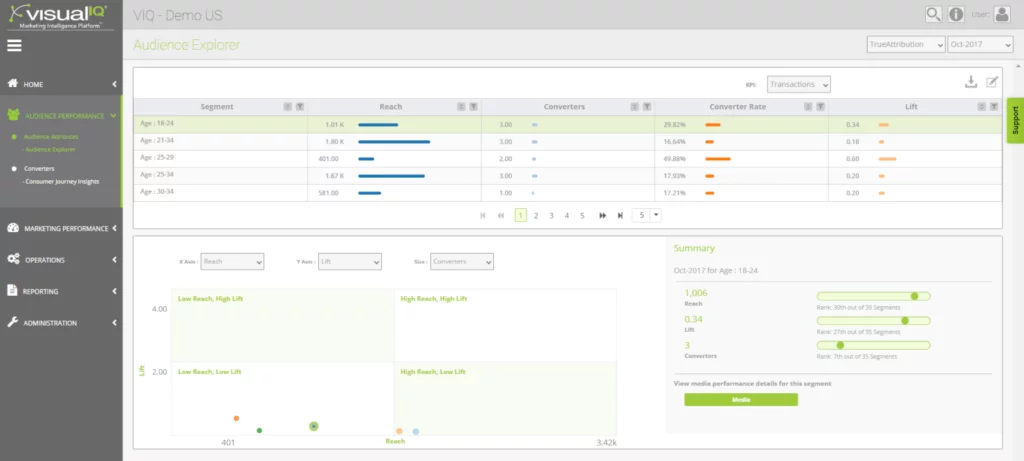
Nielsen Visual IQ offers a comprehensive data-driven solution specializing in complex attribution modeling. With a free demo and pricing upon request, it analyzes and attributes conversions across various digital touchpoints, providing marketers with in-depth insights for accurate resource allocation and campaign optimization.
Why I Picked Nielsen Visual IQ: Nielsen Visual IQ excels in providing a data-driven solution for complex attribution modeling. Its ability to measure the impact of influencer marketing and sophisticated fractional attribution models stands out. This platform offers a unique approach to understanding attribution, allowing marketers to gain insights into the contribution of various channels and touchpoints along the customer journey.
Standout Features & Integrations:
- Sophisticated fractional attribution models for accurate credit distribution.
- Measurement of the impact of influencer marketing.
Pros:
- There are plenty of getting-started resources.
- Measure the impact of influencer marketing.
- Sophisticated attribution models.
Cons:
- Pricing barriers for small businesses.
- Time-consuming initial implementation.
9. Adobe Analytics: Unleashing Advanced Attribution Models
Best for Advanced Attribution Models
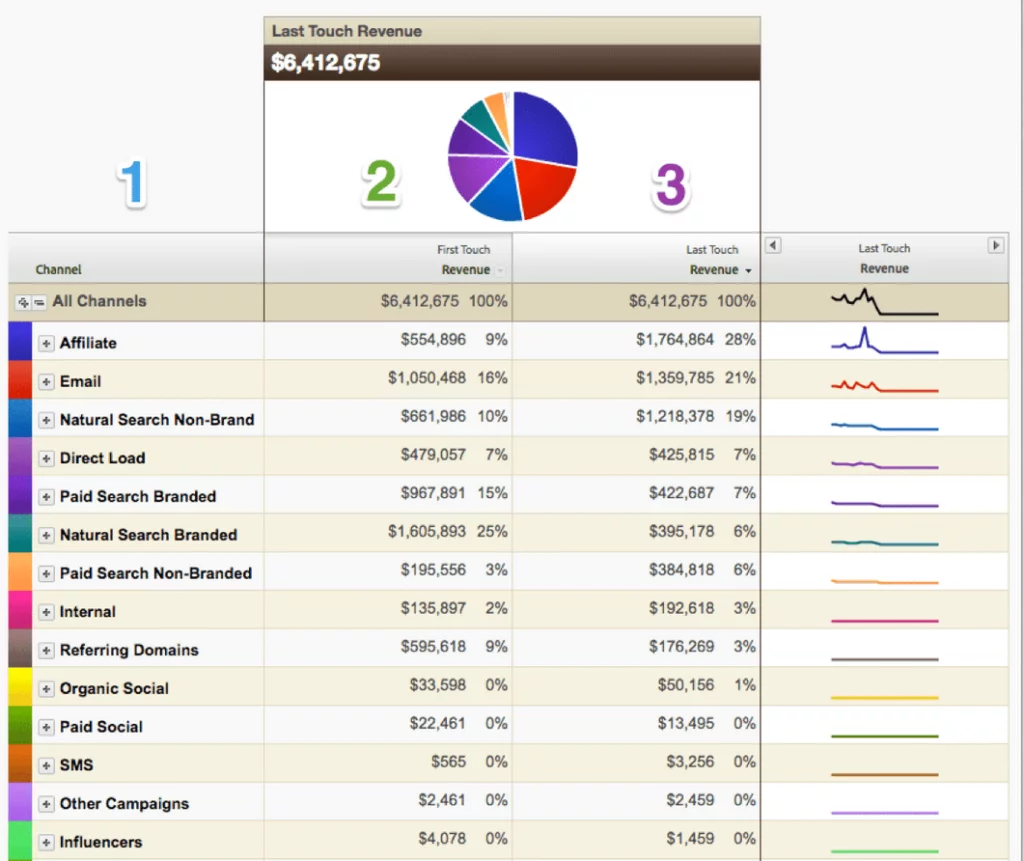
Adobe Analytics offers an integrated and comprehensive solution that empowers marketers to understand the full customer journey. With a 30-day free trial and plans starting from $33.99/month, it seamlessly combines data from websites, apps, and other digital channels, providing a holistic view of user interactions for accurate attribution and informed decision-making.
Why I Picked Adobe Analytics: Adobe Analytics excels as a marketing attribution software by seamlessly combining data from various digital channels. Its integration within the Adobe Marketing Cloud ecosystem provides a cohesive environment for leveraging data from different sources. Offering advanced attribution modeling and segmentation, Adobe Analytics enables marketers to attribute conversions and interactions accurately, facilitating data-driven decision-making and effective campaign optimization.
Standout Features & Integrations:
- Integration within the Adobe Marketing Cloud ecosystem.
- Advanced attribution modeling capabilities.
Pros:
- Advanced attribution modeling capabilities.
- Integrated within Adobe Marketing Cloud.
- Predictive analytics & anomaly detection.
Cons:
- Steep learning curve.
- Complexity for small businesses.
10. Adobe Experience Manager: Holistic Enterprise Marketing Software
Best Holistic Enterprise Marketing Software
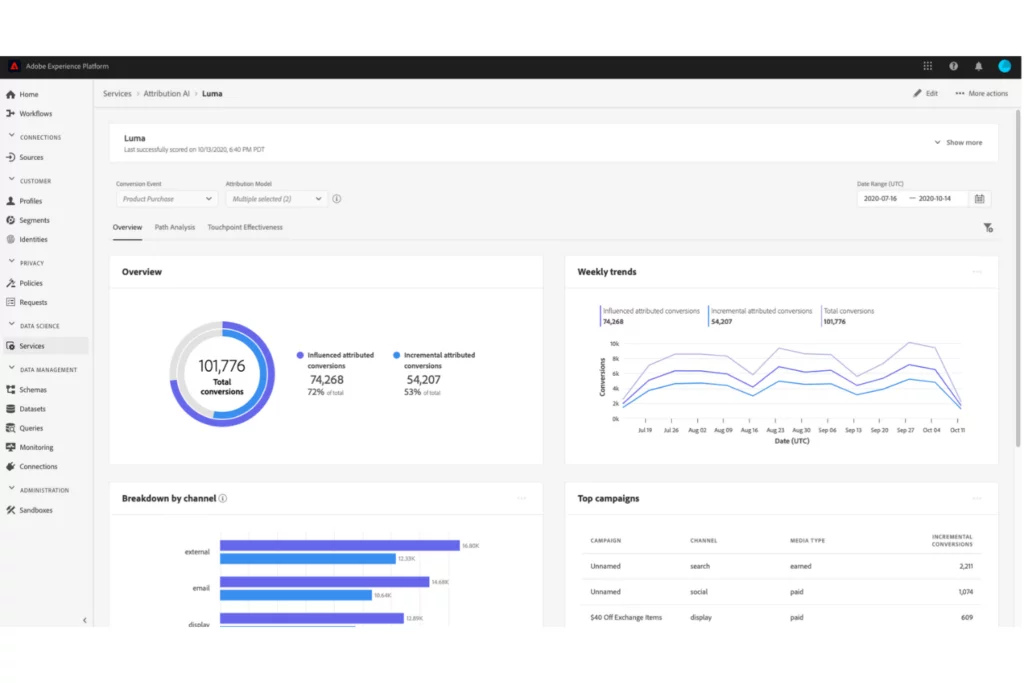
Adobe Experience Manager (AEM) offers a comprehensive marketing software solution that creates, manages, and delivers personalized digital experiences. With a free demo and plans starting from $50,000/year, AEM empowers marketers to streamline workflows, enhance customer engagement, and drive impactful marketing campaigns.
Why I Picked Adobe Experience Manager: Adobe Experience Manager (AEM) plays a pivotal role in marketing attribution by providing comprehensive insights into the customer journey. Its ability to track and analyze user interactions with digital content stands out. AEM facilitates a holistic understanding of the customer’s path to conversion by consolidating data from different sources, enabling marketers to optimize their strategies and allocate resources more effectively.
Standout Features & Integrations:
- Integration with Adobe Marketing Cloud solutions like Adobe Analytics and Adobe Target.
- Comprehensive insights into customer journeys and personalized content recommendations.
Pros:
- Deep data insights with endlessly customizable dashboards.
- Comprehensive digital experience solution.
- Feature-rich and scalable.
Cons:
- Steep learning curve.
- High entry cost for smaller enterprises.
Key Features to Consider in Marketing Attribution Software
When evaluating marketing attribution software, several key features should be considered to ensure optimal performance and insightful analysis:
- Multi-Touch Attribution Models: The software should offer a variety of attribution models to accurately credit multiple touchpoints, providing a nuanced understanding of customer interactions.
- Cross-Channel Tracking: Ability to track and analyze customer interactions across diverse online and offline channels, offering a comprehensive view of the customer journey.
- Data Integration: Seamless integration with various marketing tools, platforms, and data sources, creating a unified environment for robust attribution analysis.
- Customizable Reporting: Generate detailed reports and visualizations that showcase attribution insights, aiding marketers in understanding the impact of different touchpoints on conversions.
- Conversion Path Analysis: Provide insights into the sequences of touchpoints leading to conversions, highlighting the most influential stages in the customer journey.
- Real-Time Analytics: Offer real-time monitoring of customer interactions and attribution insights, enabling prompt reactions to changes and optimizing marketing strategies.
- Predictive Analytics: Incorporate predictive modeling to forecast future outcomes based on historical data, facilitating proactive adjustments to marketing strategies.
- Integration with Ad Platforms: Integrate with advertising platforms to attribute conversions to specific ads and campaigns, optimizing overall advertising efforts.
- User-Level Tracking: Track individual user journeys to understand unique behaviors and interactions, allowing for personalized attribution insights.
- A/B Testing and Experimentation: Facilitate A/B testing and experimentation to assess the impact of different attribution models or strategies on outcomes.
- Attribution Visualization: Provide visual representations of attribution data through graphs, charts, and dashboards for clearer insights.
- Offline Attribution: Capabilities to attribute offline interactions, such as phone calls or in-person visits, to the customer journey.
- Segmentation and Audience Analysis: Enable the segmentation of audiences for more targeted attribution analysis, helping marketers tailor strategies to specific segments.
- Usability
Usability is critical in selecting marketing attribution software, directly impacting the effectiveness and efficiency of the analysis process. A user-friendly interface and intuitive navigation enable marketers to seamlessly interact with the software, access critical insights, and interpret attribution data, regardless of technical expertise. Enhanced usability promotes higher adoption rates, reduces the learning curve, and empowers marketers to quickly harness the software’s capabilities for informed decision-making, campaign optimization, and resource allocation.
- Software Integrations
Software integrations are crucial in marketing attribution software selection as they enable a cohesive and interconnected data ecosystem. Seamless integration with existing marketing tools, CRM systems, advertising platforms, and data sources ensures a unified and comprehensive view of customer interactions. Integrations streamline data flow, eliminate silos, and allow for the incorporation of a wide range of data, enhancing the accuracy and depth of attribution insights.
- Customizability
Customizability is paramount in marketing attribution software, allowing businesses to tailor attribution models and analyses to their unique needs and objectives. The ability to adjust attribution settings, create specific rules, and incorporate relevant data sources allows businesses to accurately reflect their attribution reality. This flexibility results in more precise insights and informed decision-making aligned with the industry, target audience, and marketing strategies.
Conclusion:
In the rapidly evolving landscape of digital marketing, the role of marketing attribution software cannot be overstated. As businesses strive to understand the intricacies of customer journeys, optimize marketing strategies, and allocate resources effectively, the choice of the right attribution tool becomes a critical determinant of success.
After reviewing various marketing attribution software options such as HubSpot Attribution, Triple Whale, AppsFlyer, Google Analytics, and others, it is evident that each tool brings its unique strengths to the table. The diversity in features, ranging from multi-touch attribution models and cross-channel tracking to real-time analytics and user-level tracking, underscores the versatility demanded by modern businesses.
FAQs on Marketing Attribution Software:
What is multi-touch attribution?
Multi-touch attribution involves crediting multiple touchpoints throughout the customer journey for a single conversion, providing a more holistic understanding of the customer’s interactions.
Why is marketing attribution software important?
Marketing attribution software is crucial for understanding the effectiveness of different marketing efforts, optimizing strategies, and allocating resources efficiently. It provides insights into customer journeys, aiding in data-driven decision-making and maximizing return on investment (ROI).
Can marketing attribution software handle offline attribution?
Yes, some marketing attribution software options offer capabilities for offline attribution, allowing businesses to attribute interactions such as phone calls or in-person visits to the overall customer journey.
Is there a one-size-fits-all marketing attribution solution?
No, there is no one-size-fits-all solution. The effectiveness of marketing attribution software depends on the specific needs and characteristics of each business. Consider factors such as the complexity of your marketing channels, the level of customization required, and the depth of insights needed for informed decision-making.



